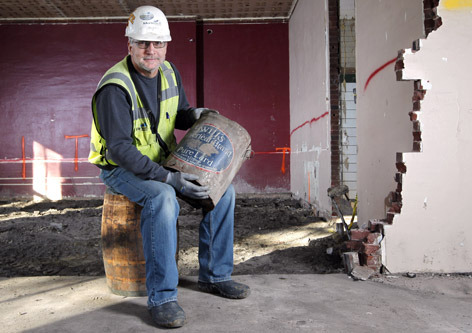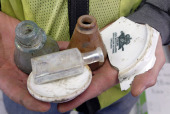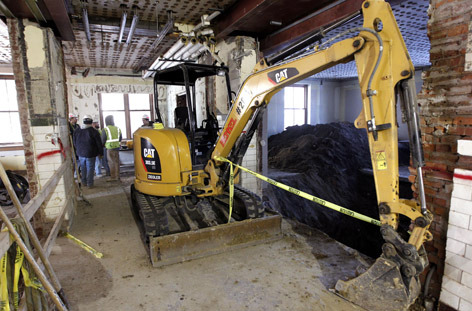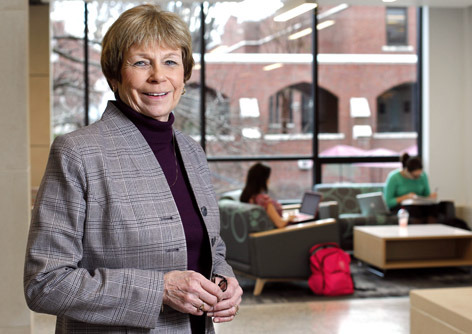Demo work in Marston turns up a few treasures

Mortenson Construction superintendent Bill Elrod sits with a cider barrel and lard bucket his crew located in the Marston Hall attic. Elrod's interest in the century-old building compelled him to do some online research into several of the pieces. Of the historical finds, Elrod said, "I think it's cool, as long as it doesn't shut my job down." Photo by Christopher Gannon.
Project manager Kerry Dixon knows that renovating Iowa State's century-old buildings may turn up a few treasures. In the last decade, she's been involved in restoration projects for Morrill Hall, Curtiss Hall and State Gym.
What's been unusual about the interior demolition of Marston Hall, which began in earnest last month, is the volume of historical pieces discovered. Workers have recovered about a dozen pieces so far and Dixon expects to find more in the next two months as the building's interior structural support is reconfigured to create larger classroom spaces.

Bill Elrod holds several of the pieces unearthed beneath Marston Hall's concrete pad. Photo by Christopher Gannon.
The pieces vary in size from several three-inch inkwells to a two-foot cider barrel. It appears they may vary in age from late 19th century to as "recent" as the 1930s. So far, the pieces have been retrieved from two locations: the building's attic, accessible only by a steel wall ladder on the fourth floor; or the dirt just beneath the building's six-inch concrete pad.
The former Engineering Hall was completed in 1903.
On display during February
Dixon said university archives will have dibs on any of the pieces it would like for its collection. Depending on the College of Engineering's plans, other pieces could be featured in an exhibit when the renovated building reopens. She said the College of Agriculture and Life Sciences is developing such an exhibit from the Curtiss renovation. In the near-term, the Marston pieces will be on display next month in a facilities planning and management public display case near 146 General Services Building.
Marston Hall's $27 million renovation, which includes all 60,000 square feet of the building, creates classrooms, student services offices and visitor and student spaces on the first two floors, and moves the college's administrative units to the top two floors. The project is being paid for by university and college funds (about two-thirds) and private gifts (about one-third). Dixon said work remains on schedule for an anticipated May 2016 move-in.

Mortenson Construction crews (pictured in the north first floor, formerly the dean's suite) are excavating beneath Marston Hall to install 12-foot support columns that will allow crews to reconfigure load-bearing walls and open up larger spaces as part of the renovation. Photo by Christopher Gannon.
Welcome

School of Education director Marlene Strathe in the new north foyer of Lagomarcino Hall. Photo by Christopher Gannon.
Marlene Strathe (pronounced "straight") became director of the School of Education on Jan. 1. She returns to her alma mater from Colorado State University, where she served as interim director of its School of Education.
Previously, Strathe served as provost and vice president for academic affairs at three public universities: Oklahoma State (2003-10), Northern Colorado (1998-2003) and North Dakota (1993-98). She also held several administrative posts at the University of Northern Iowa (1982-93).
Strathe served in key leadership positions on an interim basis, as Oklahoma State's president for a year (2007-08) and the University of North Texas at Dallas' provost for a year (2012-13).
Strathe earned four degrees from Iowa State: bachelor's degrees in bacteriology and government, a master's degree in psychology/counseling and higher education, and a doctorate in education with an emphasis in research and evaluation.
Strathe's office is 1620C in the newly renovated north side of Lagomarcino Hall. She can be reached by phone at 294-2336 or email at mstrathe@iastate.edu.
Senators learn latest about TIER process
Senior vice president and provost Jonathan Wickert gave an update on the state Board of Regents' Transparent Inclusive Efficiency Review (TIER) during his comments at the Jan. 20 Faculty Senate meeting.
He told senators that two consultants were selected to help implement administrative business cases identified in the state Board of Regents' TIER study. The Huron Consulting Group, Chicago, will work on the sourcing and procurement case, and the Chazey Partners, Campbell, California, will focus on the information technology, human resources and finance cases. He said the firms were hired on three-month contracts, beginning Feb. 1, "with specific deliverables in each of the three month work periods."
Wickert said Iowa State's own implementation proposals for the IT and HR business cases were accepted by the regents.
"Chazey will be acting not as the driver behind the plans, but really to assist us as we implement them," Wickert said.
TIER academic review
The board is working to select a consultant for the TIER academic review. Wickert said the provosts and two faculty members from each of the regents universities are participating in the selection process. He said a consultant should be selected by mid-February, with review work to begin in March.
"The new consultant on the academic affairs side will really be looking at two business cases -- one is in the area of online education and the other is in the general area of time to degree," Wickert said.
Program change
It was the procedure -- not the program -- that was rejected when a proposed name change for the master's program in operations analytics was postponed indefinitely. According to Robert's Rules of Order for parliamentary procedure, a motion can be killed (without a direct vote on the contents of the motion) by a successful vote to postpone it indefinitely.
"If you actually take a look at this, it's not really a name change -- it's the establishment of a new master's," said past-president Veronica Dark.
The master's program, jointly administered by the industrial and manufacturing systems engineering (IMSE) and statistics departments, has not enrolled students or appeared in the university catalog for as many as 20 years.
Janis Terpenny, IMSE chair, argued that the program never was eliminated, and a more modern name -- operations analytics -- would revitalize it and be a "strategic advantage" for the university's priority area of big data and analytics.
"It is an existing program," Terpenny said. "We confirmed that it was still on the books before we started."
Although the name change was not approved, senators expressed support for the master's degree in operation analytics if it was introduced as a new academic program.
"This is a procedural thing and it's also a perception thing," said president-elect Rob Wallace. "It will be an issue without question when the regents see this -- to try to interpret that a 20-year-old, defunct program is simply changing its name and somehow going to reactivate automatically."
Other business
Jonathan Sturm, professor in music and theater, was voted the next president-elect of the senate, running unopposed. Sturm and current president-elect Wallace will assume their new posts at the May 5 meeting.
Senators unanimously approved two docket items, including:
- Faculty Handbook revisions to clarify requirements for the extending the probationary period for tenure (section 5.2.1.4)
- A name change for the leadership certificate program, to certificate in leadership studies
New vehicle reservation site launches on Feb. 1
Transportation Services' new online vehicle reservation system is intended to be user-friendly (and helpful) as well as efficient, eliminating duplicative efforts among customers and dispatch staff. The new system goes live on Sunday, Feb. 1.
The web-based reservation system provided by industry leader Agile FleetCommander will be specific to Iowa State and allow campus customers to:
- Make, cancel or change a reservations instantly, 24/7
- Use their university Net-ID and password to access the site
- Access their rental history, past and future, to assist with planning or budgeting
"We believe FleetCommander will provide greater efficiency and accuracy," said transportation services manager Kathy Wellik. "I think the transition will go smoothly for our customers, but if there are any bumps, please let us know."
Getting started
Have questions?
294-1882 option 1, or 294-1657
FleetCommander will replace an online system in which customers complete a reservation template that essentially sends the request to dispatch staff in an email. A staff member still needs to process that email request before the reservation is complete.
First-time use
Customers using the new reservation system for the first time will be taken to a user profile template. They'll be asked to provide their own, as well as their supervisor's name, phone number and email address, and a department name and primary account number for billing. This is a one-time requirement and Wellik invites customers to complete this process before Feb. 1. Her staff needs to assign permissions to all system users, so customers should allow up to 24 hours for this to be completed. Once permissions are assigned, reserving vehicles is instantaneous.
Transferring reservations already made
Wellik said her team will transfer into FleetCommander all reservations made prior to Feb. 1 in the old system (for travel Feb. 1 or later). However, user profiles must exist in the new system for those transfers to be completed, so customers with those reservations have been receiving emails inviting them to create their user profiles. Wellik said her staff will follow up with this group of customers so that no reservations unintentionally get dropped.
A few notes
Wellik offered these tips to users of the FleetCommander system:
- The primary account provided in the user profile pops up automatically with each new reservation, but it can be changed
- Reservations that include a special request automatically go into an online queue that Wellik's staff works with to confirm the request can be met
- All reservations are confirmed with an email from transdispatch@iastate.edu. The supervisor provided in the user profile receives a copy of the confirmation.
Spring lectures lineup offers something for everyone
Gaming careers. Toxic water. Dinosaurs. These are only a few of the diverse topics the university's lecture series will explore this semester. A sampling of programs is highlighted below. To find out more about these and other upcoming lectures, access the lectures schedule online. All lectures are free and open to the public.
"Kiev, Ukraine: From the Collapse of Socialism to the Mass Uprising of 2013-14," Roman Cybriwsky
Feb. 9 (8 p.m., Great Hall, Memorial Union)
In his new book with the same title, Cybriwsky discusses the recent unrest and violence in Ukraine, and how the mismanagement, corruption and inequality of its capital, Kiev, helped create a civic revolt that led to the collapse of a national government. Cybriwsky is a professor in the geography and urban studies department at Temple University, Philadelphia. In 2010, he was a Fulbright Scholar at the National University of Kyiv Mohyla Academy, Kiev.
"Breaking Into and Surviving a Career in Game Development," Keith Fuller
Feb. 17 (8 p.m., MU Sun Room)
Fuller has more than 15 years of experience in the game-design industry as a developer, project manager, producer and consultant. He will discuss what it's like to be a professional game developer, along with its perks and pitfalls. Games he has worked on include Call of Duty: Black Ops, Wolfenstein, X-Men Legends and Star Trek: Voyager-Elite Force. Fuller also has written Beyond Critical, a collection of research, observations and recommendations to improve leadership in the gaming field.
"What Was in the Water? Toxic Dumping in Toms River," Dan Fagin
March 3 (7 p.m., MU Great Hall)
Fagin is an investigative reporter, prize-winning science journalist and author of Toms River: A Story of Science and Salvation, which won the 2014 Pulitzer for General Nonfiction and the National Academies Science Book Award. In his book, Fagin combines science and statistical analysis with investigative reporting to tell the story of Toms River, New Jersey, which experienced industrial pollution, a subsequent cancer epidemic and a decades-long fight for answers. Fagin is a professor of journalism at New York University and director of the graduate program in science, health and environmental reporting.
"Surviving Your Stupid, Stupid Decision to Go to Grad School," Adam Ruben
April 2 (7 p.m., MU Great Hall)
A comedian and molecular biologist, Ruben is the author of a book of the same title, which discusses the "sadistic and often hypocritical world of post-baccalaureate education through grad students' own bloodshot eyes." Ruben holds a Ph.D. in molecular biology from Johns Hopkins University, where he also teaches an undergraduate stand-up comedy class. He writes the humor column "Experimental Error" in the journal Science and blogs for the Journal of Visualized Experiments. He co-hosts Outrageous Acts of Science on the Science Channel and has appeared on the Food Network's Food Detectives, the Science Channel's Head Rush and National Public Radio's All Things Considered.
"Dinosaurs in the Digital Age," Timothy Rowe
April 23 (7 p.m., MU Great Hall)
Rowe is a paleontologist whose research focuses on the evolution and development of vertebrates. He is the director of the Vertebrate Paleontology Laboratory at the University of Texas, Austin, which holds one of the largest research collections of vertebrate fossils in America. Also co-founder and director of the university's High-Resolution X-ray Computed Tomography Facility, Rowe is developing digital technologies to analyze and visualize the skeleton and its adjoining soft tissues.
